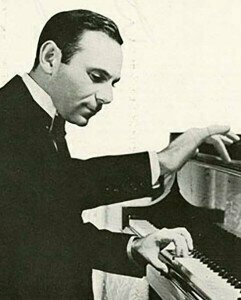
Abram Chasins

Rush Hour in Hong Kong
Chasins was appointed on the recommendation of Josef Hofmann to the faculty of the Curtis Institute of Music in Philadelphia at age 23. He performed in solo recitals and with major orchestras in the United States, Canada, South America and Europe. He also hosted a classical music radio show for decades, and published books on his colleagues Van Cliburn and Stokowski alongside a highly entertaining volume entitled “Speaking of Pianists.” A master piano stylist, he composed two piano concertos, 24 preludes, and various virtuoso two-piano transcriptions. However, his best-known and most frequently performed work is undoubtedly his Three Chinese Pieces, a set of piano miniatures that he also orchestrated. Experience an imagined “Flirtation in a Chinese Garden,” “A Shanghai Tragedy,” and the bustle of vehicular and pedestrian traffic in the “Rush Hour in Hong Kong.” These short gems were taken up by some of the finest pianists of the 20th century, including Wilhelm Backhaus, Shura Cherkassky and Josef Hofmann.
